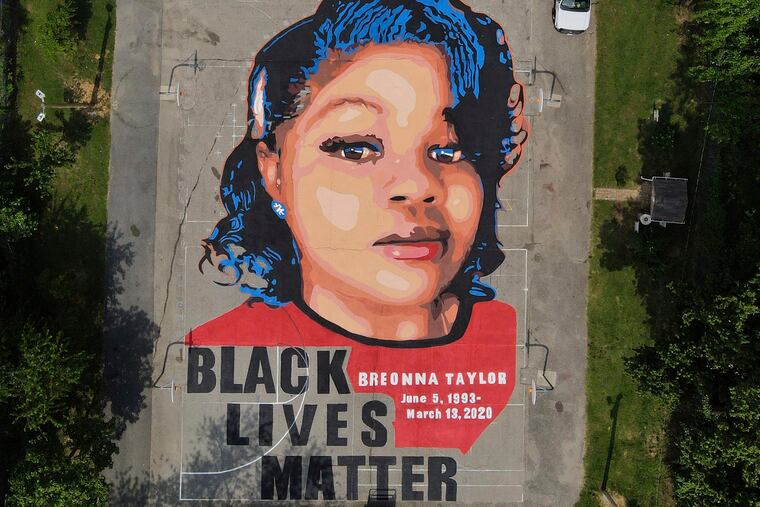After Trump special master ruling, I’m thinking of all the Black people who have died in warrant raids
For those in my community who’ve lived through the sheer terror of police bursting violently into their homes to execute searches, the decision is especially galling.

Over the course of his single turbulent term in the White House, Donald Trump populated the bench with jurists with political bona fides that often outweighed their judicial experience.
If he never again benefits from his laser focus on the judiciary, Trump’s appointment of 226 federal judges is paying off now, as he seeks to avoid a federal indictment for improperly taking classified documents from the White House. One of his appointees, U.S. District Judge Aileen Cannon, ruled that the former president could have a special master — a nongovernmental, neutral attorney — review the documents seized from Trump’s Florida home last month by FBI agents. Cannon also ruled that the government must stop its review of those documents until the special master’s work is completed.
To make matters worse, Judge Cannon agreed with Trump’s argument that an ex-president can somehow exercise executive privilege even if the current president disagrees. Then the judge, in language that was at best deferential and at worst biased, essentially placed Trump above the law, writing in her ruling, “As a function of plaintiff’s former position as president of the United States, the stigma associated with the subject seizure is in a league of its own.”
I, for one, am livid. Having lived in communities where a lawful search warrant can end with an extrajudicial killing, I have always known that the law is unequally enforced. To have it explicitly written down by a federal judge, however, is a sad confirmation of the things too many people of color have long suspected.
» READ MORE: As the FBI raids his home, Trump turns to a familiar playbook to divide America | Solomon Jones
For those in my community who’ve lived through the sheer terror of police bursting violently into their homes to execute searches, it must be especially galling to know that the stigma that Trump might experience is “in a league of its own.” What about the stigma experienced by everyday people who have been stopped and frisked when they’ve done nothing wrong? Or the grandmothers who’ve had their homes ransacked because a younger relative was accused of a crime that the elder knew nothing about?
I come from the places where police with lawful warrants will sometimes engage in unlawful activity. There is no careful consideration of people’s rights. There is no contemplation of possible lawsuits. Police break down the door, rifle through personal belongings, disrespect vulnerable people — and if an occupant of the home makes one wrong move, bullets can rain down on the innocent.
Breonna Taylor, a 26-year-old EMT with no criminal record, was killed in Louisville, Ky., when police lied to get a search warrant and raided her home in March 2020. Donovan Lewis, 20, was killed in his bed in Columbus, Ohio, last month when police went to execute a felony warrant. He was unarmed.
A little more than a decade ago, right here in Philadelphia’s Latino community, women who were not accused of crimes were subjected to sexual assaults by narcotics officers during raids, according to the Pulitzer Prize-winning Philadelphia Daily News series, Tainted Justice.
» READ MORE: Here’s the real danger of Trump saying the Black prosecutors investigating him are ‘racist’ | Solomon Jones
So, I hope you’ll excuse people of color if we’re angered when Trump cries victim. I hope you’ll understand the anguish of innocent Black men who’ve had police search their underwear on the street. I hope you’ll have sympathy for the women who’ve been sexually assaulted by officers abusing their authority.
We have watched the criminal justice system victimize generations of powerless people, and we’ve lived with the pain of that reality. But now our agony is even more acute, because we’ve seen a former president use that same system to his benefit.
In a ruling that is corrupt on its face, a judge has told America that the man who gave her a lifetime appointment to the federal bench is better than the rest of us. That he somehow deserves an extra measure of justice, because he claims that classified documents belonging to the people are actually his personal property.
She has asserted in a federal ruling that Donald Trump’s reputation is more important than the law, writing, “A future indictment, based to any degree on property that ought to be returned, would result in reputational harm of a decidedly different order of magnitude.”
I don’t think so.
My people have lost their fortunes and their dignity in police searches. They have been robbed of their rights as citizens. They have, in some instances, lost their lives.
So, I say to Judge Cannon on behalf of my community, there is no greater magnitude than that.